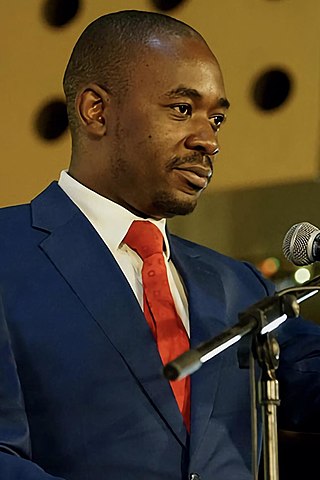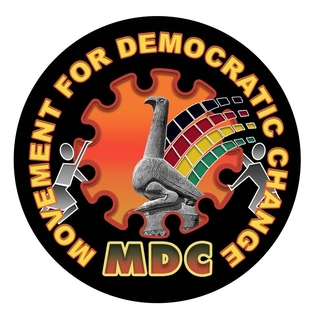Until roughly 2,000 years ago, what would become Zimbabwe was populated by ancestors of the San people. Bantu inhabitants of the region arrived and developed ceramic production in the area. A series of trading empires emerged, including the Kingdom of Mapungubwe and Kingdom of Zimbabwe. In the 1880s, the British South Africa Company began its activities in the region, leading to the colonial era in Southern Rhodesia.

Harare, formerly Salisbury, is the capital and largest city of Zimbabwe. The city proper has an area of 982.3 km2 (379.3 sq mi), a population of 1,849,600 as of the 2022 census and an estimated 2,487,209 people in its metropolitan province. The city is situated in north-eastern Zimbabwe in the country's Mashonaland region. Harare is a metropolitan province which also incorporates the municipalities of Chitungwiza and Epworth. The city sits on a plateau at an elevation of 1,483 metres above sea level, and its climate falls into the subtropical highland category.

Parliamentary elections were held in Zimbabwe on 31 March 2005 to elect members to the Zimbabwe House of Assembly. All of the 120 elected seats in the 150-seat House of Assembly were up for election. There were a further 20 members appointed by the President and ten elected by traditional chiefs, who mostly support the government. Electoral colleges for the election of the ten chiefs to the parliament were to be held on 8 April.
Operation Murambatsvina, also officially known as Operation Restore Order, was a large-scale Zimbabwean government campaign to forcibly clear slum areas across the country. The campaign started in 2005 and, according to United Nations estimates, affected at least 700,000 people directly through loss of their homes or livelihood and thus could have indirectly affected around 2.4 million people. Robert Mugabe and other government officials characterised the operation as a crackdown against illegal housing and commercial activities, and as an effort to reduce the risk of the spread of infectious disease in these areas.
Sokwanele is a popular protest underground movement based in Zimbabwe that is involved in "anonymous acts of civil disobedience." They are pro-democracy, and they embrace supporters of all pro-democratic political parties, civic organisations and institutions. Sokwanele is committed to challenging and confronting – through non-violent activism – the way in which the ruling party, Zanu-PF, governs Zimbabwe. Sokwanele's message has reached millions of citizens in Zimbabwe through their protest graffiti. Sokwanele is not affiliated to the opposition Movement for Democratic Change (MDC) at all; in fact, the group's website very clear.
The Central Intelligence Organisation (CIO) is the national intelligence agency of Zimbabwe. It was conceived as the external intelligence-gathering arm of the British South Africa Police Special Branch in the early 1960s, under the Southern Rhodesian Prime Minister Winston Field, and later served as one of the secret police organizations for President Robert Mugabe's regime.
Mudzi West is a constituency represented in the National Assembly of the Parliament of Zimbabwe, located in Mudzi District, Mashonaland East Province. Its current MP since the 2023 election is Knowledge Kaitano of ZANU–PF.
Paul Themba Nyathi is a Zimbabwean opposition politician, the director of elections for the Arthur Mutambara-led faction of the Movement for Democratic Change and a member of the Pan-African Parliament from Zimbabwe.
Gibson Jama Sibanda was a Zimbabwean politician and trade unionist. He was a founding member of the Movement for Democratic Change and at the time of his death was the Vice-President of the faction of the Movement for Democratic Change led by Arthur Mutambara. A former president of the Zimbabwe Congress of Trade Unions, he was first elected to the House of Assembly in the 2000 parliamentary election. He was a member of the Senate and a Minister of State in the Office of Deputy Prime Minister Arthur Mutambara at the time of his death in 2010.

Chivi, originally known as Chibi, is a district in the Masvingo Province of Zimbabwe. The area was originally established as a mission station in 1894 by the Berlin Missionary Society under the name Chibi Mission.

There were widespread reports of systematic and escalating violations of human rights in Zimbabwe under the regime of Robert Mugabe and his party, ZANU-PF, between 1980 and 2017.

Tendai Laxton Biti is a Zimbabwean politician who served as Finance Minister of Zimbabwe from 2009 to 2013. He is the second Vice President of Citizens Coalition for Change. He was the Secretary-General of the Movement for Democratic Change and the subsequent Movement for Democratic Change – Tsvangirai (MDC-T) political parties and a Member of Parliament for Harare East until he was expelled from the party and recalled from parliament in mid-2014,before winning the seat again in 2018.

Nelson Chamisa is a Zimbabwean politician and the former President of the Citizens Coalition For Change. He served as Member of the House of Assembly of Zimbabwe for Kuwadzana East, Harare. Chamisa was the MDC Alliance's candidate for president in the 2018 general election, having previously been the leader of the party's youth assembly. He was the Presidential candidate for the Citizens Coalition for Change in the 2023 Zimbabwean Presidential election. He has served as the former chairperson of national youth for the same party as well as the Secretary for Information and Publicity for the opposition party Movement for Democratic Change (MDC). In 2003, at the age of 25, Chamisa became the youngest Member of Parliament. Chamisa was also the youngest cabinet minister in Government of National Unity of Zimbabwe in 2009.
Lovemore Moyo is a Zimbabwean politician who was Speaker of the House of Assembly of Zimbabwe from 2008 to 2013. He was the National Chairman of the Movement for Democratic Change – Tsvangirai (MDC-T) party led by Morgan Tsvangirai from 2006 to 2018.
Zimbabwe began experiencing a period of considerable political and economic upheaval in 1999. Opposition to President Mugabe and the ZANU-PF government grew considerably after the mid-1990s in part due to worsening economic and human rights conditions. The Movement for Democratic Change (MDC) was established in September 1999 as an opposition party founded by trade unionist Morgan Tsvangirai.
Joseph Mtakwese Made was a Zimbabwean politician who served as Minister of Agriculture.
Mount Darwin West is a constituency represented in the National Assembly of the Parliament of Zimbabwe. Its current MP since the 2023 general election is Witness Jonga of ZANU–PF.

The Movement for Democratic Change – Tsvangirai (MDC–T) is a centre-left political party and was the main opposition party in the House of Assembly of Zimbabwe ahead of the 2018 elections. After the split of the original Movement for Democratic Change in 2005, the MDC–T remained the major opposition faction, while a smaller faction, the Movement for Democratic Change – Ncube, or MDC–N, was led by Welshman Ncube.
Enough Is Enough may refer to:

The Citizens Coalition for Change (CCC) is a Zimbabwean political party. It was established by former members of the Movement for Democratic Change Alliance.






